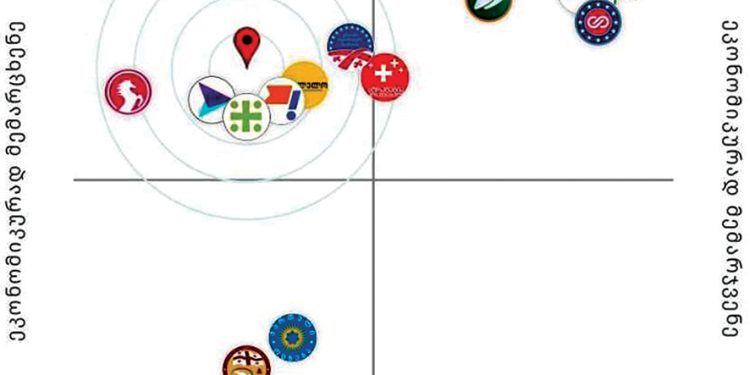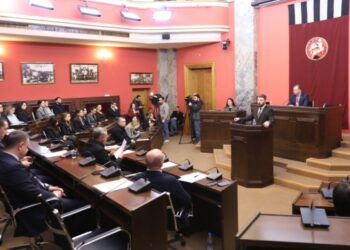On September 26, the deadline for submitting party lists for Georgia’s upcoming parliamentary elections closed, with the Central Election Commission (CEC) announcing that 19 election subjects had submitted their lists. This election cycle introduces a significant change: the prohibition of electoral blocs. Consequently, many parties have opted to unify by presenting joint lists, necessitating the dissolution of their individual identities.
One of the most notable alliances is “It’s Time for Coalition for Changes,” (Number 4) which brings together several prominent political figures and parties. This coalition includes Nika Melia, the former chairman of the United National Movement, and Nika Gvaramia, the former director of Mtavari TV. Joining them are Elene Khoshtaria’s “It’s Time” party, the “Republicans,” and “Girchi – More Freedom.” Leading the list is Nana Malashkhia, known for her role as the “woman with the EU flag” during pro-Western demonstrations in March 2023. Other significant candidates in this coalition include businessman Iva Chkonia and writer Oktai Kazumov.
Another significant platform is “Unity – National Movement,” (Number 5) which forms a coalition around the United National Movement. This alliance includes Giorgi Vashadze’s “Strategy Aghmashenebeli” and “European Georgia.” The head of this list is Tina Bokuchava, and notable candidates include Gigi Tsereteli, former vice-speaker of parliament, and Irakli Khvadagiani, a researcher with expertise in the Soviet past. This coalition emerged from internal party shifts and a desire to regain parliamentary influence.
The “Alliance of Georgian Patriots” (Number 8) has also made waves, by incorporating former members of far-right factions, including individuals with controversial pasts. The top of their list features Zurab Makharadze and Konstantine Morgoshia, both of whom have faced international sanctions due to their involvement in violent actions against journalists. Their inclusion raises questions about the party’s direction and its implications for Georgia’s political climate.
In a more centrist approach, “Strong Georgia – An Effort for the People, for Freedom!” (Number 9) has formed around the Lelo party, with Mamuka Khazaradze at the helm. Notable candidates include Ana Dolidze, an influential figure in civil rights, and former President Giorgi Margvelashvili, who, while not running for a parliamentary seat, supports the coalition’s objectives. This union aims to attract voters disillusioned with traditional party politics.
The “Labor Party of Georgia,” (Number 10) founded by Shalva Natelashvili in 1995, is making a comeback. Traditionally known for its leftist stance, the party has faced challenges in recent years, including losing state funding. Natelashvili leads the list, with Giorgi Gugava as the second candidate, as the party seeks to regain its foothold in parliament.
Another newcomer on the ballot is “Gakharia for Georgia,” (Number 25) established by former Prime Minister Giorgi Gakharia. This party has gained traction since its inception, particularly in the local government elections in 2021, where it secured 9.41% of the votes. Key figures joining this coalition include Teona Akubardia, an independent Member of Parliament, and Dimitri Tskitishvili, a former member of Georgian Dream.
The party “Girchi” (Number 36) employs a unique selection process based on contributions, allowing party members to cast votes proportional to their investments in the party, known as “Jeds.” This year’s list features politicians like Iago Khvichiya, Sandro Rakviashvili, and historian Giorgi Chauchidze, reflecting the party’s innovative approach to candidate selection.
Lastly, the ruling party, “Georgian Dream – Democratic Georgia,” (Number 41) has been a dominant force in Georgian politics since its founding by Bidzina Ivanishvili in 2012. This year, the party’s list includes 170 candidates, featuring prominent figures such as Irakli Kobakhidze, the current chairman, and Olympic champions like Lasha Talakhadze and Geno Petriashvili, showcasing the party’s strategy to blend political experience with national pride.
In total, the voting numbers for these parties are as follows:
• Number 3: Party of Unity and Development of Georgia
• Number 4: It’s Time for Coalition for Changes
• Number 5: Unity – National Movement
• Number 6: European Democrats
• Number 8: Alliance of Georgian Patriots
• Number 9: Strong Georgia – An Effort, for the People, for Freedom!
• Number 10: Labor Party of Georgia
• Number 12: Our United Georgia
• Number 13: Social Democratic Party of Georgia
• Number 16: Change Georgia
• Number 17: Georgia
• Number 20: Free Georgia
• Number 21: Tribune
• Number 23: We
• Number 25: Gakharia for Georgia
• Number 26: Left Alliance
• Number 27: Georgian Unity
• Number 36: Girchi
• Number 41: Georgian Dream – Democratic Georgia
As the election date approaches, voters in Georgia will face a diverse slate of candidates, each representing a distinct vision for the country’s future. The electoral landscape is marked by significant alliances and a range of platforms addressing critical issues, such as European integration, economic development, and social reforms. The outcome of these elections could not only reshape the parliamentary makeup, but also influence Georgia’s direction in both domestic and foreign policies for years to come. With the need to surpass the 5% threshold, the strategies adopted by these parties will be crucial in securing their presence in the new Parliament.
By Team GT














